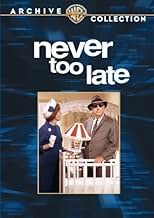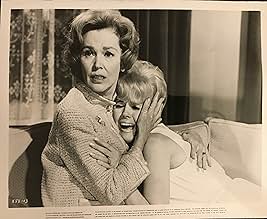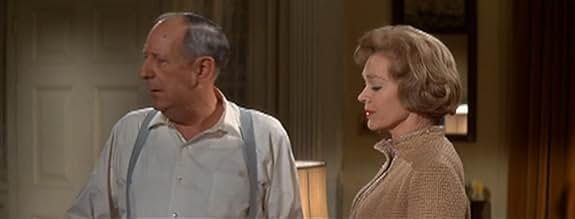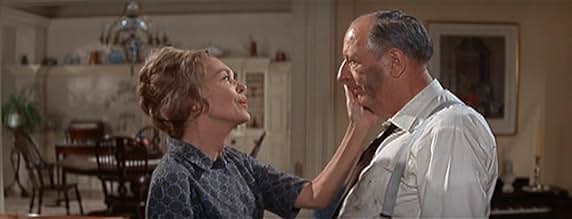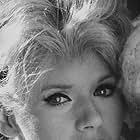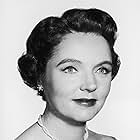Fifty-something Edith Lambert is thrilled to find out that she's going to have a baby. Her husband Harry, however, is less enthusiastic.Fifty-something Edith Lambert is thrilled to find out that she's going to have a baby. Her husband Harry, however, is less enthusiastic.Fifty-something Edith Lambert is thrilled to find out that she's going to have a baby. Her husband Harry, however, is less enthusiastic.
- Awards
- 1 nomination
Michael Abelar
- Lumberyard Man
- (uncredited)
Lou Bernard
- Lumberyard Man
- (uncredited)
Robert Biheller
- Young Husband
- (uncredited)
Ted Blair
- Lumberyard Man
- (uncredited)
Gino Cappelletti
- Lumberyard Man
- (uncredited)
Charles Dornan
- Surveyer
- (uncredited)
Johnny Eimen
- Boy
- (uncredited)
Tommy Farrell
- Fred Ainsley
- (uncredited)
Jesslyn Fax
- Saleswoman
- (uncredited)
Pamelyn Ferdin
- Little Girl in Elevator
- (uncredited)
John Francis
- Plumber
- (uncredited)
Storyline
Did you know
- TriviaTimothy Hutton (who is Jim Hutton's son) made his first screen appearance in this movie as the little boy who runs to his father.
- GoofsLate in the movie, after the "drunken fight" scene when Edith Lambert says, "it's not true" to Harry Lambert, a portable phonograph (record player) sitting on a table alternates between being crooked on the table, and being aligned with the table edge.
- Quotes
Charlie Clinton: A lot of people hate you. What's that got to do with it? Look, if the city needs lumber, it might as well be ours.
Harry M. Lambert: Just what do you mean by a lot of people hate me?
- ConnectionsReferenced in What's My Line?: Maureen O'Sullivan (1965)
- SoundtracksNever Too Late
Music by David Rose
Lyrics by Jay Livingston and Ray Evans
Sung by Vic Damone during the opening credits
Played often in the score
Featured review
... as this film clearly demonstrates. This is a cute little film about a 50 year old woman (Maureen O'Sullivan) and her 60 year old husband (Paul Ford) who find out they are going to be parents a second time. Their first and only child is a 25 year old married daughter (Connie Stevens) who, along with her 27-year old husband, lives with her parents in their large home. Her husband works for her father in his lumber supply business. This was produced by the team of Norman Lear and Bud Yorkin, and you can't help but feel they were warming up for "All in the Family" with this one, there are so many similarities. The middle-aged wife is named Edith, and prior to the pregnancy being discovered, she is running around the home at a manic pace doing housework. The son-in-law is constantly being kicked around and disrespected by his father-in-law, and the daughter is constantly bursting into tears and becoming hysterical. All that's missing is the social commentary of All in the Family.
Maureen O'Sullivan's character feels a new-found pride and femininity in her condition. Ford's character, however, is embarrassed beyond belief. After all, it proves at their advanced age they're still having sex! What's worse, they live in a small New England town where everyone knows them and stops and stares at them on the street. The grown daughter is unhappy because at the tender age of 25 she has to grow up. Mom is too old to be keeping such a large house in her condition and now it is the daughter's turn to do the cooking, the cleaning, etc. No more sleeping late, handing her dirty laundry to mom, and heading off for an afternoon of tennis. Her solution - if she gets pregnant too, her cheapskate father will have to spring for a paid housekeeper.
Sure, many of the values demonstrated here are quite dated and even sexist, but it's a cute romp with lots of humor, and who would ever have thought that the 60's could be looked back upon with nostalgia as a simpler time. Well, in this film they can be.
Maureen O'Sullivan's character feels a new-found pride and femininity in her condition. Ford's character, however, is embarrassed beyond belief. After all, it proves at their advanced age they're still having sex! What's worse, they live in a small New England town where everyone knows them and stops and stares at them on the street. The grown daughter is unhappy because at the tender age of 25 she has to grow up. Mom is too old to be keeping such a large house in her condition and now it is the daughter's turn to do the cooking, the cleaning, etc. No more sleeping late, handing her dirty laundry to mom, and heading off for an afternoon of tennis. Her solution - if she gets pregnant too, her cheapskate father will have to spring for a paid housekeeper.
Sure, many of the values demonstrated here are quite dated and even sexist, but it's a cute romp with lots of humor, and who would ever have thought that the 60's could be looked back upon with nostalgia as a simpler time. Well, in this film they can be.
- How long is Never Too Late?Powered by Alexa
Details
- Runtime1 hour 45 minutes
- Sound mix
- Aspect ratio
- 2.35 : 1
Contribute to this page
Suggest an edit or add missing content



